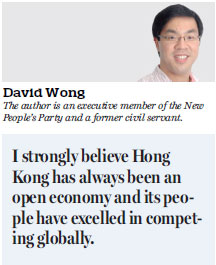Bay area gives younger generation room to grow
Updated: 2017-05-18 07:26
By David Wong(HK Edition)
|
|||||||||
The Guangdong-Hong Kong-Macao Greater Bay Area initiative will benefit Hong Kong much more than many people can now realize. It will expand Hong Kong's economic base in terms of population and geographical size. Other than financial services, Hong Kong has many other strengths which - if brought into full play in the bay area - would let us have a more diversified economy and generate more opportunities for the younger generation.
It would be much easier for technology startup companies to succeed if they were located within a large economy where they could first scale up and expand their operations. It should be no surprise that most of the existing technology and internet giant corporations are located in the United States and the Chinese mainland, the two largest economies in the world. Many of these companies enjoyed a large domestic market to grow their businesses and optimize their business model before going global and competing with everyone else. In sharp contrast, Hong Kong is a city with only 7 million plus people, which is clearly a very small market on a global scale. Currently, local internet companies have a hard time expanding into the mainland because under current regulations they are not considered native firms. Therefore, in order to facilitate the development of more startup companies, it is crucial to have closer economic ties with the mainland by enhancing cross-border cooperation with other cities in the Greater Bay Area. In other words, it is not effective for Hong Kong to develop information technology alone.

Not many people are aware that Hong Kong is a thriving cultural hub. The prestigious Art Basel in Hong Kong is an annual art fair, held in March, which attracts many world-class galleries, artists, investors and visitors from around the world. Hong Kong offers excellent exhibition services, a tax-free environment, global connectivity and proximity to the mainland. The anticipated completion of the West Kowloon Cultural District, including the Hong Kong Palace Museum, will further enhance our position as an international cultural center. Being part of the Greater Bay Area, the art fairs could appeal to even more buyers and sellers as well as bring in more audiences to local art performances. And being an expanding art hub will also help create many high-paying jobs such as those involving certification and auction as well as expand the visions and prospects of local artists.
Nowadays, sport is another emerging industry in both the mainland and Hong Kong. Despite its small size Hong Kong has had quite a few world champions in areas such as surfing, cycling and snooker over the years and many athletes qualified to compete in the Olympics and other world championships. Local boxing champion Rex Tso recently attracted much attention and popularized boxing. It is hard to be a professional athlete in Hong Kong as there is little or no commercial competition and they have to mainly rely on government subsidy. Employment after retirement from sports is also difficult since there are almost no related job vacancies. In many places, there are commercially successful leagues and sport clubs for soccer, basketball and volleyball, all of which are quite popular locally. For example, the Chinese Football Association Super League is now a lucrative business and can afford to recruit top players from around the world. It is clear that young athletes would greatly benefit if they had the opportunity to join the high-level commercial sports competitions. More local youngsters who excel in sports could finally do what they love without having to quit because of financial pressure.
The above-mentioned areas are merely some of the many opportunities available to us by forging closer ties with the Greater Bay Area and mainland as a whole. Unfortunately, it is easier said than done. Firstly, as mentioned in my previous article, many still cling on to their old prejudice and are unenthusiastic about economic cooperation with the mainland. Secondly, the relationship between the people of Hong Kong and mainland has deteriorated much in recent years. The hostility toward mainland tourists, the "Occupy Central" movement and the advocacy of independence by a small number of radical and attention-seeking youths here have infuriated many and created mistrust. Thirdly, as the mainland economy continues to grow rapidly and highly educated mainland talents work in Hong Kong, many locals fear that their role would diminish and their jobs become obsolete.
I strongly believe Hong Kong has always been an open economy and its people have excelled in competing globally. There are indeed many challenges - along with opportunities - in coming years but the solution is neither to shut our doors and retreat from the outside world nor to erect more barriers against the mainland. There is no choice but to confront the difficulties head on, by better equipping ourselves and strengthening our resolve. Hong Kong people have succeeded in the past and I have every confidence that the younger generation will rise to the challenge as well.
(HK Edition 05/18/2017 page8)